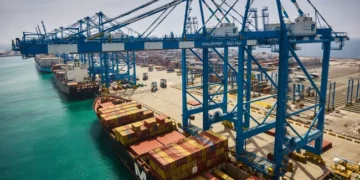As Saudi Arabia ramps up its engagement with Africa under Crown Prince Mohammed bin Salman’s Vision 2030, the Kingdom is shifting away from traditional resource extraction to embrace a broad spectrum of economic, technological, and cultural collaborations. This strategic pivot highlights Riyadh’s ambition to position itself as a multidimensional partner in Africa’s development—one that secures access to emerging markets, critical minerals, and geopolitical influence. However, the evolving relationship is not without its complexities. Global competition, governance challenges, and the pressing need for sustainable development mean that Africa’s policymakers and businesses must strike a delicate balance: capitalising on Saudi investments while safeguarding sovereignty and equitable growth.
At the heart of this recalibrated strategy is an expansion into non-traditional sectors. While mining and agriculture remain focal points—evidenced by the Public Investment Fund’s (PIF) $1.5 billion commitment to copper and cobalt ventures in Zambia and agro-industrial investments in Sudan—Riyadh is now prioritising technology, education, and renewable energy.
In 2023, the Saudi Tech Fund allocated $200 million to support African fintech startups in Nigeria, Kenya, and South Africa, a move aimed at tapping into the continent’s fast-growing digital economy. Meanwhile, Saudi Arabia’s King Abdullah University of Science and Technology (KAUST) has partnered with South Africa’s Council for Scientific and Industrial Research (CSIR) to co-develop AI-driven climate resilience models—blending Saudi capital with African innovation. Such initiatives reflect a deliberate shift from transactional resource deals to knowledge-based partnerships, aligning with both Vision 2030’s diversification objectives and Africa’s aspirations for technological self-reliance.
For African businesses, these developments present real opportunities. Startups in Kenya’s Silicon Savannah and South Africa’s booming tech hubs can access Saudi venture capital by demonstrating scalability and alignment with sustainability goals. Similarly, agribusinesses in Sudan or Zambia could partner with Saudi firms such as The Saudi Agricultural and Livestock Investment Company (SALIC) to modernise supply chains, incorporating advanced irrigation technologies or blockchain for traceability. However, to fully capitalise on these opportunities, proactive engagement is key—whether through participation in trade summits such as the Saudi-Africa Summit or leveraging platforms under the African Continental Free Trade Area (AfCFTA) to expand cross-border market access.
For policymakers, the challenge lies in attracting Saudi investment while ensuring fair and mutual benefits. One effective strategy is enforcing local content requirements, akin to Nigeria’s 40% domestic sourcing mandate for the Dangote-Saudi Aramco refinery project. Similarly, African governments could incentivise Saudi partnerships in green energy by offering tax breaks for projects aligned with national climate policies, such as Namibia’s $10 billion green hydrogen collaboration with NEOM.
To further bolster investor confidence, governments must also strengthen regulatory frameworks. Rwanda, for example, has successfully positioned itself as an investor-friendly hub through its Ease of Doing Business reforms. Meanwhile, regional bodies such as the African Union (AU) and the Southern African Development Community (SADC) could play a crucial role in standardising regulations, enabling collective bargaining for fairer deals with Saudi investors.
Saudi Arabia’s economic engagement with Africa extends beyond business investments into financial and diplomatic cooperation. The Saudi-African Economic Partnership, launched at the 2023 Riyadh Summit, has catalysed joint ventures in healthcare—exemplified by Saudi firm ACWA Power financing solar-powered hospitals in Malawi and Rwanda. Meanwhile, the Saudi EXIM Bank’s $50 million agreement with the African Export-Import Bank (Afreximbank) is set to improve credit access for small and medium-sized enterprises, thereby enhancing intra-African trade.
Saudi Arabia is also deploying soft power strategies, such as increasing Hajj quotas for African pilgrims and funding educational institutions. This blend of economic diplomacy and cultural influence highlights Riyadh’s intent to deepen its footprint in Africa beyond financial investments.
Saudi Arabia’s expanding African footprint does not exist in a vacuum. The Kingdom faces stiff competition, particularly from China’s Belt and Road Initiative (BRI), which has poured over $130 billion into African infrastructure since 2010. In comparison, Saudi investments remain relatively modest. However, Riyadh is differentiating itself by focusing on niche sectors such as green energy, exemplified by NEOM’s $10 billion green hydrogen project in Namibia.
Yet, contradictions remain. While Saudi Arabia is pushing green initiatives, it is also investing in fossil fuel projects, such as Angola’s Lobito Refinery. Critics argue that such ventures undermine Riyadh’s sustainability pledges, potentially alienating climate-conscious African states.
Saudi competition with the UAE also complicates matters. The United Arab Emirates’ DP World has established a stronghold in East African ports, prompting Riyadh to counterbalance with a $500 million port deal in Somaliland—sparking regional tensions with Somalia. Similarly, Saudi Arabia’s courtship of Ethiopia, including discussions over Red Sea access, signals a strategic bid to secure maritime trade routes while countering Iranian influence in Muslim-majority nations.
The trajectory of this relationship could take multiple paths. One possibility is symbiotic growth, where African governments ensure value addition through local content mandates. Nigeria’s requirement that 40% of components for the Dangote-Saudi Aramco refinery be sourced domestically is an example of how such policies can foster job creation and industrial development. Likewise, lithium-rich countries such as Zimbabwe and the Democratic Republic of Congo (DRC) could negotiate Saudi investments in battery manufacturing, reducing reliance on raw material exports.
On the other hand, competitive fragmentation remains a risk. Ethiopia’s Somaliland port deal has already strained relations with Somalia, illustrating how infrastructure rivalries might exacerbate regional tensions. In Southern Africa, nations such as Mozambique or Angola—keen to attract investment but grappling with high debt—could find themselves drawn into opaque, high-stakes negotiations.
Climate considerations add another layer of complexity. Saudi Arabia’s $2.5 billion pledge for African renewable energy projects aligns with global sustainability goals, yet its continued fossil fuel investments could alienate climate-vulnerable nations. Countries such as Malawi and Zambia, already experiencing severe droughts linked to climate change, may increasingly favour partnerships with European or Asian investors prioritising green transitions. While success stories such as NEOM-Namibia’s green hydrogen initiative demonstrate potential alignment, Saudi Arabia’s ability to reconcile its oil legacy with its clean energy ambitions will determine its credibility as a long-term partner.
Governance remains a persistent challenge. In fragile states such as Sudan or the Sahel, corruption and regulatory instability—highlighted in Transparency International’s 2023 report—threaten the sustainability of Saudi-backed projects. Investors wary of political volatility may prioritise stable markets such as South Africa or Rwanda, inadvertently exacerbating regional disparities. For Saudi investments to drive inclusive growth, African governments must strengthen transparency frameworks, ensuring capital inflows do not merely enrich elites.
For African businesses, adaptability will be key. Small and medium enterprises (SMEs) can leverage initiatives such as the Afreximbank-Saudi EXIM Bank credit facility to access low-interest loans, enabling them to scale operations and expand cross-border trade. Sectors such as halal pharmaceuticals and Islamic finance—where Saudi expertise aligns with Africa’s growing demand—present untapped potential. Research collaborations, such as KAUST’s partnerships with African universities, could further accelerate innovation in biotechnology and renewable energy storage.
Beyond the economic dimensions, Saudi Arabia’s evolving relationship with Africa reflects a broader geopolitical play. By positioning itself as a champion of technological and green transitions, Riyadh is reshaping its global image—from an oil-dependent monarchy to a forward-thinking, multilateral actor. For African nations, the challenge will be to harness this external investment without ceding strategic autonomy.
The Saudi-African partnership stands at a crossroads. Will it become a model for mutual benefit, driven by innovation and shared climate goals? Or will it fall into the pitfalls of geopolitical rivalry and unsustainable investment? The answer will depend on Riyadh’s willingness to align its investments with Africa’s developmental priorities and on African leaders’ ability to negotiate partnerships that prioritise sovereignty, sustainability, and equitable growth.












